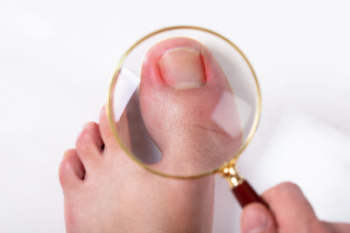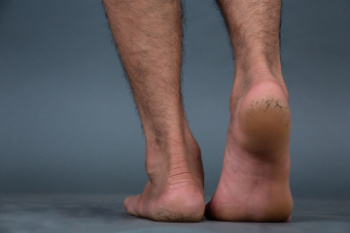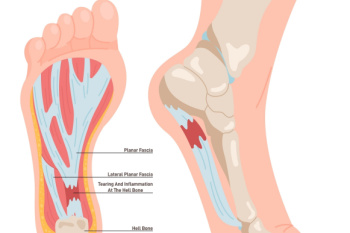Items filtered by date: January 2025
Why Live with Pain and Numbness in Your Feet?
Symptoms and Causes of an Infected Ingrown Toenail

An ingrown toenail occurs when the edge of a toenail grows into the surrounding skin, often leading to pain and swelling. If left untreated, an ingrown toenail can become infected. Symptoms of an infected ingrown toenail include increased redness, warmth surrounding the affected area, and noticeable swelling. In more severe cases, pus or fluid may drain from the area, and the skin may become tender to the touch. The infection can cause throbbing pain, which may worsen with pressure from shoes or walking. Ingrown toenails are commonly caused by improper nail trimming, wearing tight footwear, or injury to the toe. They can also be influenced by genetics or certain foot conditions. If an ingrown toenail becomes infected, it is suggested that you promptly contact a podiatrist who can effectively treat this condition.
Ingrown toenails may initially present themselves as a minor discomfort, but they may progress into an infection in the skin without proper treatment. For more information about ingrown toenails, contact Jordan S. Steinberg, DPM of Florham Park Podiatry . Our doctor can provide the care you need to keep you pain-free and on your feet.
Ingrown Toenails
Ingrown toenails are caused when the corner or side of a toenail grows into the soft flesh surrounding it. They often result in redness, swelling, pain, and in some cases, infection. This condition typically affects the big toe and may recur if it is not treated properly.
Causes
- Improper toenail trimming
- Genetics
- Improper shoe fitting
- Injury from pedicures or nail picking
- Abnormal gait
- Poor hygiene
You are more likely to develop an ingrown toenail if you are obese, have diabetes, arthritis, or have any fungal infection in your nails. Additionally, people who have foot or toe deformities are at a higher risk of developing an ingrown toenail.
Symptoms
Some symptoms of ingrown toenails are redness, swelling, and pain. In rare cases, there may be a yellowish drainage coming from the nail.
Treatment
Ignoring an ingrown toenail can have serious complications. Infections of the nail border can progress to a deeper soft-tissue infection, which can then turn into a bone infection. You should always speak with your podiatrist if you suspect you have an ingrown toenail, especially if you have diabetes or poor circulation.
If you have any questions, please feel free to contact our office located in Florham Park, NJ . We offer the newest diagnostic and treatment technologies for all your foot care needs.
Protect Your Ankles and Feet While Playing Pickleball

Pickleball, one of the fastest-growing sports, offers fun and fitness but comes with risks for sprains, fractures, and falls that affect the ankles and feet. Sudden pivots, quick lateral movements, and uneven court surfaces can strain ligaments or even lead to fractures. Proper warmups are essential to reduce injury. It is important to spend a few minutes stretching calves, Achilles tendons, and hamstrings, and practice gentle ankle rotations. Gradually increasing your heart rate with light jogging or dynamic stretches can prepare your muscles for the game’s demands. Wearing supportive footwear and paying attention to court conditions are additional ways to minimize falls. If you experience foot pain after a pickleball game, it is suggested that you consult a podiatrist who can assess the injury and provide treatment.
Sports related foot and ankle injuries require proper treatment before players can go back to their regular routines. For more information, contact Jordan S. Steinberg, DPM of Florham Park Podiatry . Our doctor can provide the care you need to keep you pain-free and on your feet.
Sports Related Foot and Ankle Injuries
Foot and ankle injuries are a common occurrence when it comes to athletes of any sport. While many athletes dismiss the initial aches and pains, the truth is that ignoring potential foot and ankle injuries can lead to serious problems. As athletes continue to place pressure and strain the area further, a mild injury can turn into something as serious as a rupture and may lead to a permanent disability. There are many factors that contribute to sports related foot and ankle injuries, which include failure to warm up properly, not providing support or wearing bad footwear. Common injuries and conditions athletes face, including:
- Plantar Fasciitis
- Plantar Fasciosis
- Achilles Tendinitis
- Achilles Tendon Rupture
- Ankle Sprains
Sports related injuries are commonly treated using the RICE method. This includes rest, applying ice to the injured area, compression and elevating the ankle. More serious sprains and injuries may require surgery, which could include arthroscopic and reconstructive surgery. Rehabilitation and therapy may also be required in order to get any recovering athlete to become fully functional again. Any unusual aches and pains an athlete sustains must be evaluated by a licensed, reputable medical professional.
If you have any questions please feel free to contact our office located in Florham Park, NJ . We offer the newest diagnostic and treatment technologies for all your foot and ankle needs.
How Vitamin Deficiencies Can Lead to Cracked Heels

Cracked heels can be uncomfortable and unsightly, and vitamin deficiencies may contribute to their development. Insufficient levels of certain vitamins, especially from the B-vitamin group, can cause the skin to become dry and brittle, leading to cracks. Vitamin B1, also known as thiamine, plays a key role in maintaining healthy skin, and a deficiency can result in rough, cracked skin on the feet. Vitamin B3, or niacin, helps the skin retain moisture and improve its elasticity, preventing cracks. Vitamin B6 supports the body's ability to repair damaged tissues, including the skin, while vitamin B12 is vital for maintaining skin health and preventing dryness. A lack of these vitamins can impair the skin’s ability to stay hydrated and repair itself, making the heels more prone to cracking. If you have developed cracked heels, it is suggested that you contact a podiatrist who can effectively treat this condition.
If the skin on your feet starts to crack, you may want to see a podiatrist to find treatment. If you have any concerns, contact Jordan S. Steinberg, DPM from Florham Park Podiatry . Our doctor can provide the care you need to keep you pain-free and on your feet.
Cracked Heels
It is important to moisturize your cracked heels in order to prevent pain, bleeding, and infection. The reason cracked heels form is because the skin on the foot is too dry to support the immense pressure placed on them. When the foot expands, the dry skin on the foot begins to split.
Ways to Help Heal Them
- Invest in a good foot cream
- Try Using Petroleum Jelly
- Ease up on Soaps
- Drink Plenty of Water
Ways to Prevent Cracked Heels
- Moisturize After Showering
- Skip a Shower
- Keep Shower Water Lukewarm
- Don’t Scrub Your Feet
If you are unsure how to proceed in treating cracked heels, seek guidance from a podiatrist. Your doctor will help you with any questions or information you may need.
If you have any questions, please feel free to contact our office located in Florham Park, NJ . We offer the newest diagnostic and treatment technologies for all your foot care needs.
Understanding Plantar Fasciitis

Plantar fasciitis is a common condition that causes pain in the heel and bottom of the foot. The primary cause of plantar fasciitis is repeated stress or strain on the fascia, often due to excessive walking, running, or standing. Other factors like wearing poor footwear, tight calf muscles, or being overweight can also contribute. The most noticeable symptom is sharp pain in the heel, especially when taking the first steps in the morning or after periods of rest. As the day progresses, the pain may lessen but can return with prolonged standing or walking. Diagnosis typically involves a physical examination where a podiatrist may palpate the heel and foot, and sometimes imaging tests to rule out other conditions. If you have heel pain, it is suggested that you contact a podiatrist who can accurately diagnose and treat plantar fasciitis.
Plantar fasciitis is a common foot condition that is often caused by a strain injury. If you are experiencing heel pain or symptoms of plantar fasciitis, contact Jordan S. Steinberg, DPM from Florham Park Podiatry . Our doctor can provide the care you need to keep you pain-free and on your feet.
What Is Plantar Fasciitis?
Plantar fasciitis is one of the most common causes of heel pain. The plantar fascia is a ligament that connects your heel to the front of your foot. When this ligament becomes inflamed, plantar fasciitis is the result. If you have plantar fasciitis you will have a stabbing pain that usually occurs with your first steps in the morning. As the day progresses and you walk around more, this pain will start to disappear, but it will return after long periods of standing or sitting.
What Causes Plantar Fasciitis?
- Excessive running
- Having high arches in your feet
- Other foot issues such as flat feet
- Pregnancy (due to the sudden weight gain)
- Being on your feet very often
There are some risk factors that may make you more likely to develop plantar fasciitis compared to others. The condition most commonly affects adults between the ages of 40 and 60. It also tends to affect people who are obese because the extra pounds result in extra stress being placed on the plantar fascia.
Prevention
- Take good care of your feet – Wear shoes that have good arch support and heel cushioning.
- Maintain a healthy weight
- If you are a runner, alternate running with other sports that won’t cause heel pain
There are a variety of treatment options available for plantar fasciitis along with the pain that accompanies it. Additionally, physical therapy is a very important component in the treatment process. It is important that you meet with your podiatrist to determine which treatment option is best for you.
If you have any questions, please feel free to contact our office located in Florham Park, NJ . We offer the newest diagnostic and treatment technologies for all your foot care needs.

